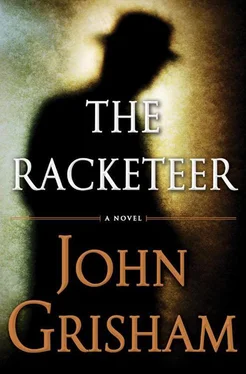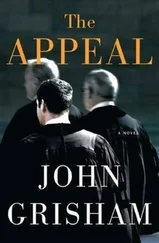John Grisham - The Racketeer
Здесь есть возможность читать онлайн «John Grisham - The Racketeer» весь текст электронной книги совершенно бесплатно (целиком полную версию без сокращений). В некоторых случаях можно слушать аудио, скачать через торрент в формате fb2 и присутствует краткое содержание. Жанр: Криминальный детектив, на английском языке. Описание произведения, (предисловие) а так же отзывы посетителей доступны на портале библиотеки ЛибКат.
- Название:The Racketeer
- Автор:
- Жанр:
- Год:неизвестен
- ISBN:нет данных
- Рейтинг книги:4 / 5. Голосов: 1
-
Избранное:Добавить в избранное
- Отзывы:
-
Ваша оценка:
- 80
- 1
- 2
- 3
- 4
- 5
The Racketeer: краткое содержание, описание и аннотация
Предлагаем к чтению аннотацию, описание, краткое содержание или предисловие (зависит от того, что написал сам автор книги «The Racketeer»). Если вы не нашли необходимую информацию о книге — напишите в комментариях, мы постараемся отыскать её.
The Racketeer — читать онлайн бесплатно полную книгу (весь текст) целиком
Ниже представлен текст книги, разбитый по страницам. Система сохранения места последней прочитанной страницы, позволяет с удобством читать онлайн бесплатно книгу «The Racketeer», без необходимости каждый раз заново искать на чём Вы остановились. Поставьте закладку, и сможете в любой момент перейти на страницу, на которой закончили чтение.
Интервал:
Закладка:
This is what I explain to young Otis Carter, a twenty-three-year-old father of two who’ll spend the next fourteen months here at Frostburg for a crime that should not have been a crime. Otis is a country boy, a Baptist with a deep faith, a happily married electrician who still cannot believe he’s in a federal prison. He and his grandfather were indicted and charged with violating the Civil War Battlefield and Artifact Preservation Act of 1979 (as amended in 1983, 1989, 1997, 2002, 2008, and 2010). His grandfather, aged seventy-four and suffering from emphysema, is in a Federal Medical Center in Tennessee, also serving fourteen months. Because of his medical condition, he will cost the taxpayers about $25,000 a month.
The Carters were hunting for artifacts on their two-hundred-acre farm adjacent to the New Market Battlefield State Historical Park, in the Shenandoah Valley, less than an hour from my hometown of Winchester. The farm has been in the family for over a hundred years, and from the time he could walk, Otis accompanied his grandfather as he “went digging” for Civil War relics and souvenirs. Over the decades, his family assembled an impressive collection of minie balls, cannonballs, canteens, brass buttons, pieces of uniforms, a couple of battle flags, and several dozen guns of all varieties. This they had done legally. It is illegal to remove artifacts and relics from a National Historic Landmark, which is federal land, and the Carters were well aware of this law. Their private little museum, in a converted hay barn, was stocked with items they had found on their own property.
However, in 2010, the Civil War Battlefield and Artifact Preservation Act was amended again. In response to efforts by preservationists to restrict development near battlefields, some last-minute language was added to a one-hundred-page amendment. It became illegal to dig for relics “within two miles” of the borders of a National Historic Landmark, regardless of whose land one happened to be digging on. The Carters were not informed of the new rules; indeed, the language was buried so deep in the amendment virtually no one knew about it.
Over the years, the federal agents had harassed Otis’s grandfather and accused him of digging on protected land. They periodically stopped by his home and demanded to see his museum. When the law changed, they waited patiently until they caught Otis and his grandfather scouring a wooded area of Carter property with metal detectors. The Carters hired a lawyer who advised them to plead guilty. Criminal intent is no longer required for many federal crimes. Lack of knowledge is no defense.
As the victim of the Racketeer Influenced and Corrupt Organizations Act (RICO), an often misguided and famously flexible federal law, I am keenly interested in the proliferation of the federal criminal code, now at twenty-seven thousand pages and counting. The Constitution names only three federal offenses: treason, piracy, and counterfeiting. Today there are over forty-five hundred federal crimes, and the number continues to grow as Congress gets tougher on crime and federal prosecutors become more creative in finding ways to apply all their new laws.
Otis could possibly attack the constitutionality of the amended law. This would take several years of litigation and would drag on long after he’s paroled and back home with his family. As I explain this to him during our second meeting, he seems to lose interest. If he can’t get out right now, why bother? But the case intrigues me. We decide to discuss it later.
If my grand scheme falls flat, I might take Otis’s case and fight all the way to the Supreme Court. That will keep me busy for the next five years.
The Supreme Court has twice refused to consider my case. Though we couldn’t prove it, there was a strong feeling that my appeals were hurried through the system because of the government’s enthusiasm in putting away Barry Rafko and his confederates, me included.
I was convicted in November 2005 and sentenced two months later to ten years. At my sentencing I was “remanded,” which meant I was taken into custody. A few lucky federal felons are allowed to “self-surrender,” or remain free until ordered to report to a facility. They have time to prepare, but most are not given this luxury.
My lawyer thought I would get five or six years. Barry the Backhander, the star defendant, the target, the colorful villain everyone enjoyed hating, got twelve years. Surely I deserved less than half the time of that slimeball. Dionne, my beautiful and loving and fiercely supportive wife, was in the courtroom, sitting bravely next to my humiliated father. I was the only one of the eight sentenced that day, and as I stood before Judge Slater, with my lawyer to my right, I had trouble breathing. This cannot be happening, I said to myself, over and over, as I took in the blurred images around me. I don’t deserve this. I can explain. I am not guilty. Slater scolded and preached and played for the press, and I felt like a battered heavyweight in the fifteenth round, sagging on the ropes, covering my face, waiting for the next shot to the face. My knees were putty. I was sweating.
When Judge Slater said “ten years,” I heard a gasp behind me as Dionne collapsed in tears. As they led me away, I glanced back for the last time. I’ve seen this a hundred times in movies, TV shows, and in real-life court reporting-the last, frantic farewell look of the condemned. What do you think about as you’re leaving the courtroom and you’re not going home? The truth is that nothing is clear. There are too many random thoughts, too much fear, anger, and raw emotion to understand what is happening.
Dionne had both hands over her mouth, in shock, crying, tears everywhere. My father had his arm around her, trying to console her. That was the last thing I saw-my beautiful wife distraught and destroyed.
Now she’s married to someone else.
Thanks to the federal government.
My jurors came from the District. A few appeared bright and educated, but most were not, shall I say, sophisticated. After three days of deliberations, they announced to the judge that they were making little progress. And who could blame them? By unloading a sizable chunk of the federal code, the prosecutors had adopted the timeworn strategy of throwing as much mud as possible against the wall and hoping something would stick. This overkill had turned what should have been a relatively easy case against Barry Rafko and the congressman into a legal quagmire. I had spent countless hours working on my own defense, and I couldn’t understand all of the prosecution’s theories. From the beginning, my lawyer had predicted a hung jury.
After four days of deliberations, Judge Slater delivered what is commonly referred to in trial circles as the “dynamite charge.” This is basically a demand that the jurors get back there and reach a verdict, at all costs. You’re not going home until we have a verdict! Such a charge rarely works, but I wasn’t so lucky. An hour later, the exhausted and emotionally spent jurors returned with unanimous verdicts against all defendants, on all counts. It was obvious to me and many others that they did not understand most of the code sections and intricate theories used by the prosecution. One of the jurors was later quoted as saying, “We just assumed they were guilty, or else they wouldn’t have been charged in the first place.” I used this quote in my appeals, but it apparently went unheard.
I watched the jurors carefully throughout the trial, and they were overwhelmed from the opening statements. And why shouldn’t they have been? Nine different lawyers gave their versions of what had happened. The courtroom had to be redesigned and renovated to make room for all of the defendants and all their lawyers.
The trial was a spectacle, a farce, a ridiculous way to search for the truth. But as I learned, the truth was not important. Perhaps in another era, a trial was an exercise in the presentation of facts, the search for truth, and the finding of justice. Now a trial is a contest in which one side will win and the other side will lose. Each side expects the other to bend the rules or to cheat, so neither side plays fair. The truth is lost in the melee.
Читать дальшеИнтервал:
Закладка:
Похожие книги на «The Racketeer»
Представляем Вашему вниманию похожие книги на «The Racketeer» списком для выбора. Мы отобрали схожую по названию и смыслу литературу в надежде предоставить читателям больше вариантов отыскать новые, интересные, ещё непрочитанные произведения.
Обсуждение, отзывы о книге «The Racketeer» и просто собственные мнения читателей. Оставьте ваши комментарии, напишите, что Вы думаете о произведении, его смысле или главных героях. Укажите что конкретно понравилось, а что нет, и почему Вы так считаете.












